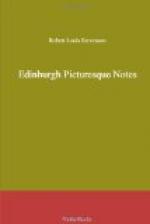and comely approach to Princes Street from the east,
lined with hotels and public offices, makes a leap
over the gorge of the Low Calton; if you cast a glance
over the parapet, you look direct into that sunless
and disreputable confluent of Leith Street; and the
same tall houses open upon both thoroughfares.
This is only the New Town passing overhead above
its own cellars; walking, so to speak, over its own
children, as is the way of cities and the human race.
But at the Dean Bridge, you may behold a spectacle
of a more novel order. The river runs at the
bottom of a deep valley, among rocks and between
gardens; the crest of either bank is occupied by
some of the most commodious streets and crescents
in the modern city; and a handsome bridge unites
the two summits. Over this, every afternoon,
private carriages go spinning by, and ladies with
card-cases pass to and fro about the duties of society.
And yet down below, you may still see, with its
mills and foaming weir, the little rural village of
Dean. Modern improvement has gone overhead
on its high-level viaduct; and the extended city
has cleanly overleapt, and left unaltered, what was
once the summer retreat of its comfortable citizens.
Every town embraces hamlets in its growth; Edinburgh
herself has embraced a good few; but it is strange
to see one still surviving — and to see it
some hundreds of feet below your path. Is it
Torre del Greco that is built above buried Herculaneum?
Herculaneum was dead at least; but the sun still
shines upon the roofs of Dean; the smoke still rises
thriftily from its chimneys; the dusty miller comes
to his door, looks at the gurgling water, hearkens
to the turning wheel and the birds about the shed,
and perhaps whistles an air of his own to enrich
the symphony — for all the world as if Edinburgh
were still the old Edinburgh on the Castle Hill,
and Dean were still the quietest of hamlets buried
a mile or so in the green country.
It is not so long ago since magisterial David Hume
lent the authority of his example to the exodus from
the Old Town, and took up his new abode in a street
which is still (so oddly may a jest become perpetuated)
known as Saint David Street. Nor is the town
so large but a holiday schoolboy may harry a bird’s
nest within half a mile of his own door. There
are places that still smell of the plough in memory’s
nostrils. Here, one had heard a blackbird on
a hawthorn; there, another was taken on summer evenings
to eat strawberries and cream; and you have seen
a waving wheatfield on the site of your present residence.
The memories of an Edinburgh boy are but partly
memories of the town. I look back with delight
on many an escalade of garden walls; many a ramble
among lilacs full of piping birds; many an exploration
in obscure quarters that were neither town nor country;
and I think that both for my companions and myself,
there was a special interest, a point of romance,




